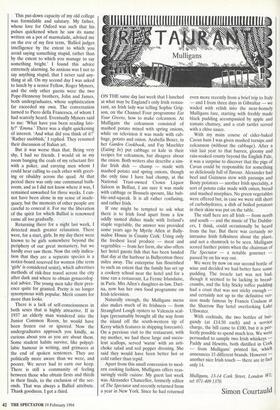ON THE same day last week that I lunched at
what may be England's only Irish restau- rant, an Irish lady was telling Sophie Grig- son, on the Channel Four programme Eat Your Greens, how to make colcannon. At Mulligans the colcannon consisted of mashed potato mixed with spring onions, while on television it was made with cab- bage, potato and onion. Arabella Boxer, in her Garden Cookbook, and Fay Maschler (Eating In) put cabbage or kale in their recipes for colcannon, but disagree about the onion. Both writers also describe a sim- ilar Irish dish — champ — made with mashed potato and spring onions, though the only time I have had champ, at the National Trust-owned Crown Liquor Saloon in Belfast, I am sure it was made with cabbage or Brussels sprouts, like bub- ble-and-squeak. It is all rather confusing, and rather Irish.
If one might be tempted to ask what there is to Irish food apart from a few oddly named dishes made with Ireland's staple vegetable, the answer was provided some years ago by Myrtle Allen at Bally- maloe House in County Cork. Using only the freshest local produce — meat and vegetables — from her farm, she also offers her hotel guests fish that has been landed that day at the harbour in Ballycotton three miles away. The enterprise has flourished to such an extent that the family has set up a cookery school near the hotel and for a time ran a restaurant, La Ferme Irlandaise, in Paris. Mrs Allen's daughter-in-law, Dari- na, now has her own food programme on Irish television.
Naturally enough, the Mulligans menu also makes much of its Irishness — from Strangford Lough oysters to Valencia scal- lops (presumably brought all the way from the island off the south-western tip of Kerry which features in shipping forecasts). On a previous visit to the restaurant, with my mother, we had these large and succu- lent scallops, served 'warm' with an arti- choke salad and red pepper dressing. She said they would have been better hot or cold rather than tepid.
Apart from this small concession to mod- ern cooking fashion, Mulligans offers reas- suringly vieille cuisine. My guest last week was Alexander Chancellor, formerly editor of The Spectator and recently returned from a year in New York. Since he had returned
even more recently from a brief trip to Italy — and I from three days in Gibraltar — we waded with relish into the near-homely Mulligans fare, starting with freshly made black pudding accompanied by apple and tomato chutney, and a crab tartlet served with a chive sauce.
With my main course of cider-baked Cavan ham I was given mashed turnips and colcannon (without the cabbage). After a visit last year to that barren, gloomy and rain-soaked county beyond the English Pale, it was a surprise to discover that the pigs of Cavan could be responsible for something so deliciously full of flavour. Alexander had beef and Guinness stew with parsnips and Boxty potatoes — another Irish speciality, a sort of potato cake made with onion, bread and mashed murphies. No green vegetables were offered but, in case we were still short of carbohydrates, a dish of boiled potatoes in their skins was put on the table.
The staff here are all Irish — from north and south — and the music of The Dublin- ers, I think, could occasionally be heard from the bar. But there was certainly no intrusive Irish folksiness about the place, and not a shamrock to be seen. Mulligans scored further points when the chairman of The Spectator — a notable gourmet passed by on his way out.
We were by now on our second bottle of wine and decided we had better have some pudding. The treacle tart was not bad, though it seemed to be lacking in bread- crumbs, and the Icky Sticky toffee pudding had a crust that was not sticky enough and certainly not up to the definitive ver- sion made famous by Francis Coulson at the Sharrow Bay hotel overlooking Lake Ullswater.
With cocktails, the two bottles of bur- gundy (at £14.50 each) and a service charge, the bill came to £100, but it is per- fectly possible to spend much less. We were persuaded to sample two Irish whiskeys Paddy and Hewitts, both distilled in Cork — from Mulligans' printed list, which announces 15 different brands. However another nice Irish touch — there are in fact only 14.
Mulligans, 13-14 Cork Street, London Wl; tel: 071-4091370.
Simon Courtauld


















































 Previous page
Previous page